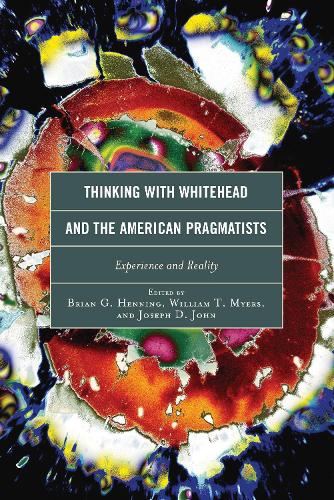
Thinking with Whitehead and the American Pragmatists: Experience and Reality
(Hardback)
Publishing Details
Thinking with Whitehead and the American Pragmatists: Experience and Reality
By (Author) Brian G. Henning
Edited by William T. Myers
Edited by Joseph D. John
Contributions by George Allan
Contributions by Steven Meyer
Contributions by Thomas M. Jeannot
Contributions by Nancy Frankenberry
Contributions by Scott Sinclair
Contributions by Maria Regina Brioschi
Contributions by Michael Brady
Bloomsbury Publishing PLC
Lexington Books
16th April 2015
United States
Classifications
Professional and Scholarly
Non Fiction
Philosophy: logic
144.3
Physical Properties
Hardback
272
Width 159mm, Height 237mm, Spine 26mm
544g
Description
Despite there being deep lines of convergence between the philosophies of Alfred North Whitehead, C. S. Peirce, William James, John Dewey, and other classical American philosophers, it remains an open question whether Whitehead is a pragmatist, and conversation between pragmatists and Whitehead scholars have been limited. Indeed, it is difficult to find an anthology of classical American philosophy that includes Whiteheads writings. These camps began separately, and so they remain. This volume questions the wisdom of that separation, exploring their connections, both historical and in application. The essays in this volume embody original and creative work by leading scholars that not only furthers the understanding of American philosophy, but seeks to advance it by working at the intersection of experience and reality to incite novel and creative thought. This exploration is long overdue. Specific questions that are addressed are: Is Whitehead a pragmatist What contrasts and affinities exist between American pragmatism and Whiteheads thought What new questions, strategies, and critiques emerge by juxtaposing their distinct perspectives
Reviews
Thinking with Whitehead and the American Pragmatists counters the growing silence between Whiteheadian process philosophy and pragmatism, seeking to liberate both from self-imposed narrowness. The essays by fourteen scholars take on a range of probing topics and in so doing also expose the richness of ideas yet to be explored. Each essay opens up a conversation worth having. I hope this volume helps revive the speculative pulse in American philosophy. -- Thomas M. Alexander, Southern Illinois University at Carbondale
The timely and well-executed Thinking with Whitehead and the American Pragmatists finds it necessary, once again, to knock down ill-conceived barriers separating these two quite compatible philosophical conversations. While it may be true that, stylistically, Whiteheads writings differ markedly from the classical American pragmatists, anyone who reads this volume will have no doubt that Whiteheads work belongs alongside that of Peirce, James, Dewey, and Mead. [T]here is good reason to hope that this new volume will be useful in inspiring those who find themselves cocooned in either the process or pragmatic camps. If it inspires even a few to look beyond artificially drawn intellectual boundaries, it will have served us all well. * American Journal of Philosophy & Theology *
The intellectual fortunes of the classical American pragmatism of Peirce, James, and Dewey and of the process philosophy of Alfred North Whitehead are on the upswing today, after a long period of neglect and then the invention of neo-pragmatism and the turn of process thought to Hartshornean lines. This wonderful volume calls attention to the affinities, divergences, and often unnoticed mutual influences of pragmatism and Whitehead. Largely though not entirely the work of younger scholars, these essays come at the process-pragmatism double-helix from many fascinating angles. It deserves to be read by anyone promoting pragmatism or process philosophy, as well as by their opponents! -- Robert C. Neville, Boston University
Welcome, indeed, is this series of trenchant essays, reinvigorating the presence, the depth, and the wide-ranging importance of the philosophy of A.N. Whitehead. Wise and helpful also, is the forging of major connections between Whitehead and the rich traditions of the Classical American philosophers, especially with the philosophy of William James. -- John J. McDermott, Texas A&M University
Author Bio
Brian G. Henning is professor of philosophy at Gonzaga University. William T. Myers is professor of philosophy at Birmingham-Southern College. Joseph D. John is a PhD candidate at Southern Illinois University at Carbondale.
